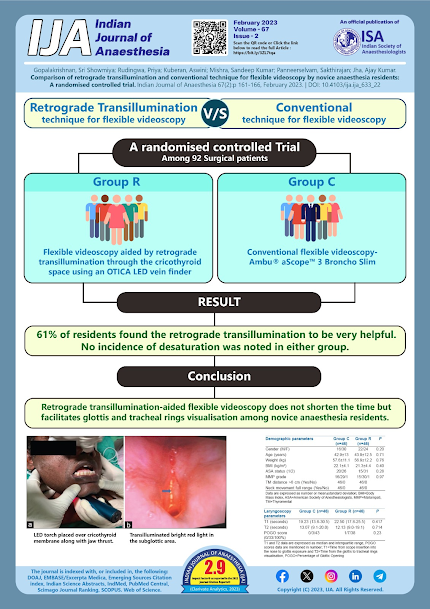ORIGINAL ARTICLE
Comparison of retrograde transillumination and
conventional technique for flexible videoscopy by novice anaesthesia residents:
A randomised controlled trial
Gopalakrishnan et al. , Indian Journal of Anaesthesia 67(2):p
161-166, February 2023.
PMID: 37091437
PMCID: PMC10121094
Introduction:
- ü Acquisition of skills in airway videoscopy is crucial for anesthesiology training.
- ü Video laryngoscopy and flexible videoscopy are essential skills.
- ü Retrograde transillumination may aid in better visualization of airway structures
Methods:
- ü A randomized controlled trial involving 92 surgical patients.
- ü Randomized into two groups: Group C (Conventional videoscopy) and Group R (Retrograde transillumination-assisted videoscopy).
- ü Anaesthesia residents were trained to perform flexible videoscopy.
- ü Retrograde transillumination was achieved using an OTICA LED vein finder
Results:
- ü Time to visualize the glottis (T1) and time to see the tracheal rings (T2) were comparable between the two groups.
- ü 61% of residents found retrograde transillumination very helpful.
- ü No incidence of desaturation was noted in either group.
Conclusion:
- Retrograde
transillumination-assisted flexible videoscopy aids in identifying the glottis
and makes the procedure more manageable for learners.
Cite:
Gopalakrishnan, Sri Showmiya; Rudingwa, Priya; Kuberan, Aswini; Mishra,
Sandeep Kumar; Panneerselvam, Sakthirajan; Jha, Ajay Kumar. Comparison of
retrograde transillumination and conventional technique for flexible videoscopy
by novice anaesthesia residents: A randomised controlled trial. Indian Journal
of Anaesthesia 67(2):p 161-166, February 2023. | DOI: 10.4103/ija.ija_633_22


No comments:
Post a Comment